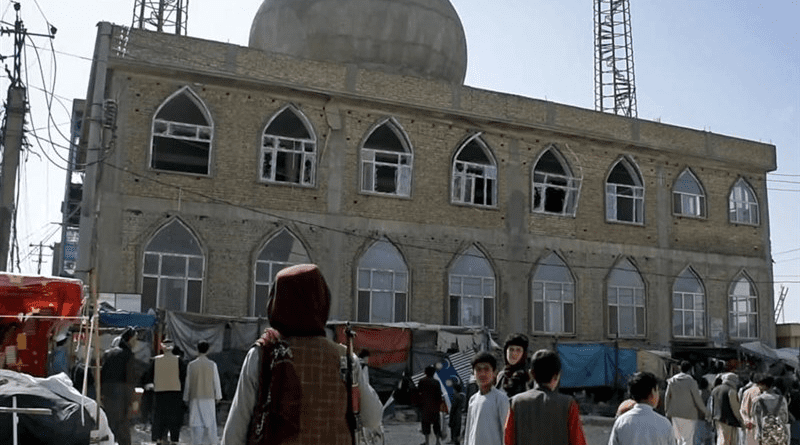Islamic State Militants Killing Afghans Indiscriminately
A bomb blast ripped through a masjid during Friday prayers in northern Afghanistan, killing 33 people including children, just a day after a militant Islamic group had claimed two separate deadly attacks.
Meanwhile, Taliban forces have arrested a suspected militant who allegedly had planned a bomb attack that killed at least 12 offering prayers at a Shia masjid on Thursday, police said.
Balkh province’s police spokesman said Abdul Hamid Sangaryar was a key operative of the Islamic State (IS).
Since Taliban fighters seized control of Afghanistan last year after ousting the US-backed government, the number of bombings has fallen but IS militants have continued with attacks against targets they see as heretical.
A string of bombings rocked the country this week, with deadly attacks targeting a school and a masjid in Shia neighbourhoods.
Taliban government spokesman Zabihullah Mujahid tweeted that children were among the 33 dead in the blast on Friday at a masjid in the northern province of Kunduz. “We condemn this crime… and express our deepest sympathies to the bereaved,” he said, adding that 43 more were wounded.
An intelligence official said on condition of anonymity that the explosion was caused by a bomb, but it was unclear how it was detonated.
An AFP correspondent saw large holes blown through the walls of the Sunni Mawlavi Sikandar masjid, popular with Sufis in Imam Sahib District, north of Kunduz city.
One side of the mosque was completely destroyed by the explosion.
“The sight at the mosque was horrifying. All those who were offering prayers inside the masjid were either injured or killed,” Mohammad Esah, a shopkeeper who helped in carrying victims to the district hospital, told AFP.
“I saw 20 to 30 bodies,” a local resident said.
Relatives of victims arrived at the local hospital to look for their loved ones.
“My son is martyred,” screamed one man, while a woman accompanied by her four children searched for her husband.
A nurse told AFP over the phone that between 30 and 40 people had been admitted for treatment of wounds from the blast.
About a dozen ambulances were seen carrying the seriously wounded to the main provincial hospital in Kunduz city. “The shrapnel injuries on the bodies of the wounded show they were caused by a bomb explosion,” a doctor at the provincial hospital told AFP.
Friday’s blast was one of the biggest attacks since the Taliban seized power on August 15 last year.
The deadliest was just days later when more than 100 Afghan civilians and 13 US servicemen were killed in a suicide attack at Kabul airport as tens of thousands were trying to flee the country.
The regional IS branch in Sunni-majority Afghanistan has repeatedly targeted Shias and Sufis, who follow a mystical branch of Islam. IS a Sunni group like the Taliban, but the two are bitter rivals.
Shia Afghans, who are mostly from the Hazara community, make up between 10 and 20 per cent of Afghanistan’s population of 38 million. Taliban officials insist their forces have defeated IS, but analysts say the jihadist group is a key security challenge.
“Since the Taliban took power, the only achievement that they are proud of is the improvement in security,” said Hekmatullah Hekmat, an independent political and security expert.
In an earlier attack on Thursday, at least 16 people were killed by bomb blasts in two Afghan cities — including 12 offering prayers in a Shia masjid in an attack claimed by IS.
Earlier this week, at least six people were killed in twin blasts that hit a boys’ school in a Shia neighbourhood of Kabul.
Twelve people were killed and 58 wounded, including 32 were in serious condition.
In a separate blast on Thursday in the city of Kunduz, at least four people were killed and 18 wounded when a bicycle bomb exploded near a vehicle carrying mechanics working for the Taliban, police spokesman Obaidullah Abedi said.
Taliban officials insist their forces have defeated the IS, but analysts say the group is a key security challenge. Since seizing power, the Taliban have regularly raided suspected IS hideouts in eastern Nangarhar province.
In May last year at least 85 people — mainly girl students — were killed and about 300 wounded when three bombs exploded near their school in the Shia-dominated Dasht-i-Barchi neighbourhood of Kabul.
No group claimed responsibility for that, but in October 2020 the IS admitted a suicide attack on an educational centre in the same area that killed 24 people, including students.
In May 2020, the group was blamed for a bloody attack on a maternity ward of a hospital in the same neighbourhood that killed 25 people, including new mothers.

